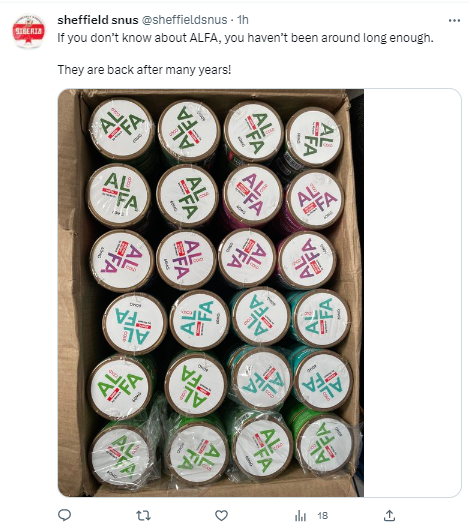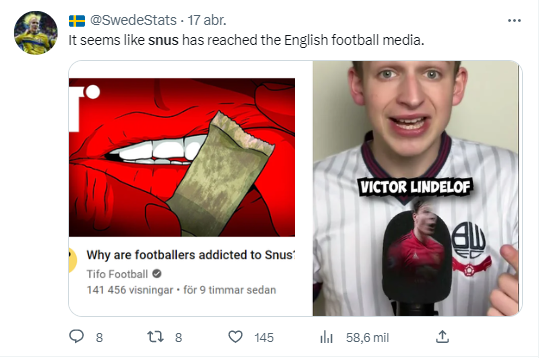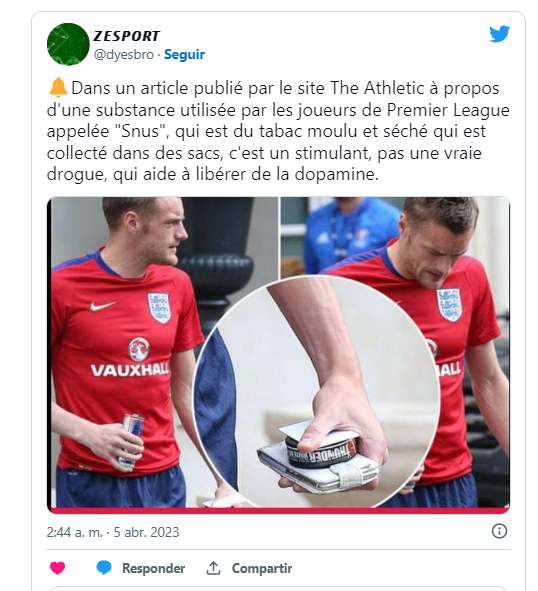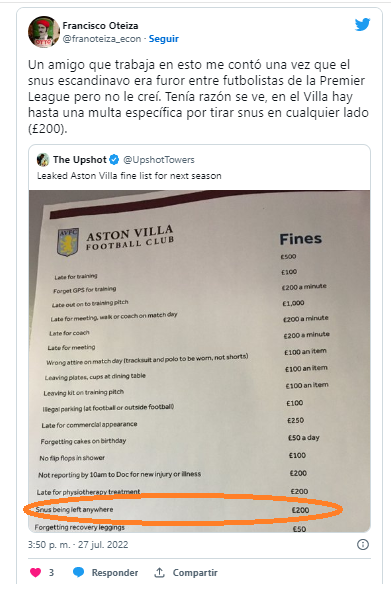El estimulante del que se habla poco y se utiliza mucho (SPA-ENG)

Hace un par de años escuché por primera vez la palabra "snus", un amigo que regresaba de Europa, un apasionado del fútbol y de las carreras pedestres de largo alcance me comentó sobre este tabaco que mezclado con algunas otras sustancias actúa como estimulante, es de origen sueco y lo había visto utilizar entre algunos de los corredores del evento en el que estuvo participando y del que no había ningún tipo de penalidad ni alerta por parte de las autoridades. No se lo consideraba ni considera en la actualidad una droga de la cual se pueda obtener ventaja deportiva.
Sin embargo, en los últimos tiempos hay una creciente preocupación en todas las ligas de fútbol europeo, su consumo no para de crecer, inclusive es mencionado por periodistas deportivos quienes indican su utilización entre varias de las figuras más relevantes de las principales ligas; ya hay estudios serios que indican un impacto nocivo en su utilización prolongada.

Este producto conocido como snus es una especie de tabaco para uso oral que tiene sus orígenes y es utilizado desde hace varias décadas principalmente en Noruega, Suecia y otros países del norte de Europa. En un primer momento fue adoptado por muchos como una forma de reducir el consumo de los fumadores.
El producto está compuesto de una mezcla de tabaco con agua, sal y un conjunto de aromatizantes que se vende ensobrado en envases pequeños similares al de un saquito de té, según los fabricantes cada sobre contiene aproximadamente unos 27,5 mg. de nicotina, casi el triple de un cigarrillo común.
La forma de consumirla es introduciendo el sobre entre las mejillas y las encías o debajo de la lengua.

Las preguntas abundan, aunque no las respuestas. ¿Mejora el rendimiento? ¿reduce el cansancio? ¿posee un efecto calmante y relajante? Algunos expertos aseguran que mantiene la alerta y las fuerzas, eso parecería ser algo muy cercano a brindar una ventaja deportiva.
Para algunos es más dañino y adictivo que el cigarrillo.
Un dato alarmante indica que en el año 1992 fue prohibido en gran parte de Europa luego de vincular su utilización con algunas variantes de cáncer. Su venta está prohibida en la mayoría de los países del viejo continente aunque no en Suecia donde continúa siendo legal.

Pese a las advertencias y su prohibición, el uso continúa en alza y por ejemplo en Inglaterra algunos ex jugadores y entrenadores opinan que al menos el 40% de los futbolistas de la Premier lo consume con habitualidad.
Es un tema tabú desde el vestuario hacia afuera pero como sabemos las noticias corren como reguero de pólvora y en la actualidad los nombres de jugadores que se mencionan como consumidores habituales sorprende a todos, muchas grandes estrellas de los principales equipos están en esa lista.
A fines de marzo una fotografía de Karim Benzema mostrando su lengua teñida de azul después de convertir un gol cosechó un sin fin de especulaciones y hay casos de futbolistas que han sido vistos consumiéndolo en pleno partido.
Estudios publicados por una importante revista de medicina deportiva italiana sobre muestras de orina de todos los jugadores italianos muestran claramente un importante aumento de residuos de nicotina.

Seguramente el tema de la presión y la exposición de los jugadores está teniendo un papel importante, muchos tratan de calmar la ansiedad de diversas maneras y esta parece ser una que ha pegado demasiado entre ellos.
Veremos que deciden las autoridades deportivas de cada equipo, liga y la propia FIFA que ya están alertadas de la problemática; resta al menos un estudio profundo y comprometido sobre varios aspectos del consumo de este producto, principalmente para preservar la salud de los atletas y de millones de fanáticos que los idolatran y copian.
The stimulant that is little talked about and widely used
A couple of years ago I heard the word "snus" for the first time, a friend who was returning from Europe, a fan of football and long-distance running, told me about this tobacco mixed with some other substances that act as a stimulant, it is of Swedish origin and had seen it used among some of the runners of the event in which he was participating and for which there was no penalty or alert from the authorities. It was not considered and is not currently considered a drug from which one can obtain a sporting advantage.
However, in recent times there is a growing concern in all European soccer leagues, its consumption does not stop growing, it is even mentioned by sports journalists who indicate its use among several of the most relevant figures in the main leagues; There are already serious studies that indicate a harmful impact in its prolonged use.
This product known as snus is a kind of tobacco for oral use that has its origins and has been used for several decades mainly in Norway, Sweden, and other northern European countries. At first, it was adopted by many as a way to reduce consumption by smokers.
The product is made up of a mixture of tobacco with water, salt, and a set of flavorings that is sold in small packages similar to a tea bag. According to the manufacturers, each envelope contains approximately 27.5 mg. of nicotine, almost triple that of a common cigarette.
The way to consume it is by inserting the envelope between the cheeks and gums or under the tongue.
Questions abound, though not answers. Does it improve performance? does it reduce fatigue? Does it have a calming and relaxing effect? Some experts say that it maintains alertness and strength, which would seem to be something very close to providing a sporting advantage.
For some, it is more harmful and addictive than cigarettes.
An alarming fact indicates that in 1992 it was banned in a large part of Europe after linking its use with some cancer variants.
Its sale is prohibited in most of the countries of the old continent, although not in Sweden where it continues to be legal.
Despite the warnings and its prohibition, its use continues to rise and, for example, in England, some former players and coaches believe that at least 40% of Premier League footballers consume it regularly.
It is a taboo subject from the locker room to the outside but as we know the news spreads like wildfire and nowadays the names of players that are mentioned as regular consumers surprise everyone, many great stars from the main teams are on that list.
At the end of March, a photograph of Karim Benzema showing his tongue dyed blue after scoring a goal garnered endless speculation and there are cases of footballers who have been seen consuming it in the middle of a game.
Studies published by a leading Italian sports medicine journal on urine samples from all Italian players show a significant increase in nicotine residues.
Surely the issue of pressure and exposure of the players is playing an important role, many try to calm anxiety in various ways and this seems to be one that has hit too hard among them.
We will see what the sports authorities of each team, league, and FIFA itself, which are already alerted to the problem, decide; At least one deep and committed study remains on various aspects of the consumption of this product, mainly to preserve the health of athletes and millions of fans who idolize and copy them.
Héctor Gugliermo
@hosgug
https://twitter.com/1350124638584627204/status/1649059191171039233
The rewards earned on this comment will go directly to the people( @hosgug ) sharing the post on Twitter as long as they are registered with @poshtoken. Sign up at https://hiveposh.com.
Ciertamente el uso de sustancias "extra-deportivas" es un tema que no es nuevo y así como longevo, es extremadamente difícil de controlar pese a todas las rigurosas medidas. Es lamentablemente el otro lado de la moneda que tiene el deporte. Esperemos que el uso de esta y otras sustancias pueda ser mitigado pronto
Coincido plenamente. Gracias por tus comentarios @vjap55 !!